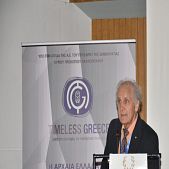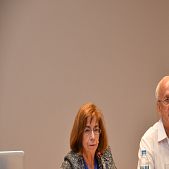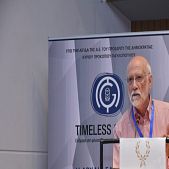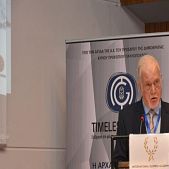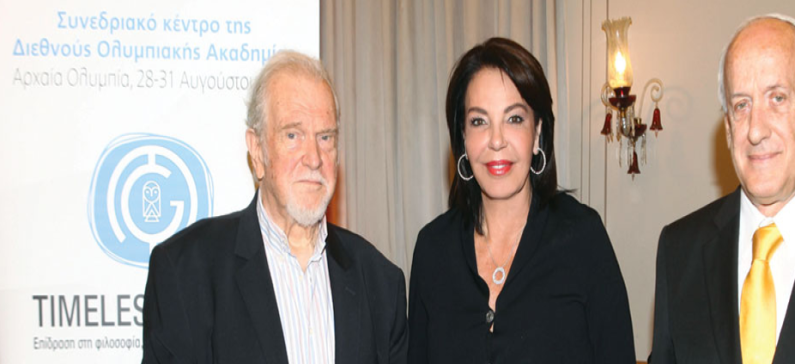
Ancient Greece and the modern world
The conference “Ancient Greece and the modern world” was held in the Conference Centre at the International Olympic Academy, Ancient Olympia (Archaeological Site), Greece, in 28-31 August 2016. The conference aims at an interdisciplinary approach to the civilization of Ancient Greece and its influence on the modern world, through a wide areas of human activities, from philosophy, art and science to extraordinary technological conceptions and applications, in many cases comparable to modern scientific and technological achievements.
Greek President Prokopis Pavlopoulos opened the conference stating that “The ancient Greek spirit can help the people today to defend our endangered culture”. European Commission First Vice President Frans Timmermans and EU’s migration commissioner Dimitris Avramopoulos also addressed the delegates.
“For the re-activation of this living legacy and for the contribution of this unique legacy to the cause of promoting a new relation between progress and knowledge, I took the initiative, together with leading academics from Greece and abroad, to establish the International Center of Sciences and Hellenic Values. Our name is Timeless Greece. It is a name signifying a country identified with Science, Culture and Values. The country, the brand name that cannot be separated into ancient and new. An indivisible entity, in time, geography, body and spirit. We believe that this realization is a powerful injection of confidence for Greeks and for all people sharing the values of Hellenic Education” stated Ms Katerina Panagopoulou, Ambassador of Greece to the Council of Europe on Sport, Tolerance and Fair Play.
Ομιλία Κατερίνας Παναγοπούλου στο συνέδριο: “Αρχαία Ελλάδα και Σύγχρονος Κόσμος”.
Posted by Katerina Panagopoulos on Tuesday, 6 September 2016
180 distinguished academics from around the world represented practically all scientific disciplines proving that ancient Greek civilisation can offer new points to be researched that will open new horizons to modern science.
We will mention some of the presentations in order to get a glimpse of the substance and the dimension of the conference.
The president of the International Association of Machines and Mechanisms Marco Ceccarelli on his speech he proved, that ancient engineering is still recognized in modern Engineering both in terms of principles and methods and the design of mechanisms. Specifically he claimed that the ancient background is still smoldering in the latest development activities and promotion of Engineering.
In his work “Machines and Machines’ theories in antiquity” Professot Teun Koetsier, points out that for a long time, our view of classical archaiotita was dominated by the influence of Plato. This led to a distorted picture of the relationship between science and technology, where mathematicians considered knowledge on practical matters as inferior. This view must be revised. In particular the Antikythera mechanism is a good example that shows that there are close relations between Mathematics and craftsmen.
Summing up the speech of the internationally renowned Professor George Paxinos entitled “The contribution of ancient Greece in Neuroscience”, we see that some pre Sokratic philosophers reject supernatural causes and mythical explanations of the natural world and the nature of the soul. Hippocrates (460-377 BC) said: “People need to know that from the brain only derive pleasures, joys, sorrows, laughter and pain, sorrow and tears.” After the stragle to find the position of the soul, psychology loses its soul in 1930. According to Hebei (1958), the mind is the synthesis of neuron energy. If the relationship between brain and behavior is 1 to 1, then it is not necessary to assume that there is a soul to understand behavior and change it.
The research team led by professor Stavros Papamarinopoulos (University of Patras, Department of Geology), the Assistant professor P. Preka-Papadima and researchers P. Antonopoulos, E. Mitropetrou, P. Mitropetros and C. Sarantitis (University of Athens, Department of Astrophysics-Astronomy and Engineering, Department of Physics), investigated the astronomical data in the Iliad and the Odyssey and discovered the date of return of Ulysses to Ithaca and the date of the Fall of Troy.
Professors Alcibiades Paipetis and Stefanos Paipetis (University of Ioannina – Patras) presented an engineering analysis of the functionality of Ulysses’ arc that led to the conclusion that fully confirmed that the archer should be a man of great muscular strength, intelligence and dexterity.
Professor M. Wright (Imperial College, London) mentioned the text of Cicero depicting the order of Archimedes, which apparently was a precursor of the Antikythera Mechanism.
Professor A. Cotsiolis (University of Patras) and Dr. N. Labropoulos after examining the symmetry in classical Greece as a philosophical, moral and mathematical sense and in particular the symmetry in the realm, they proved that the isoperimetric inequality of Plato’s School is associated with modern sobolev type inequalities which are the main tool of the theory of optimization (which finds application in mathematical physics, economy, etc.)



